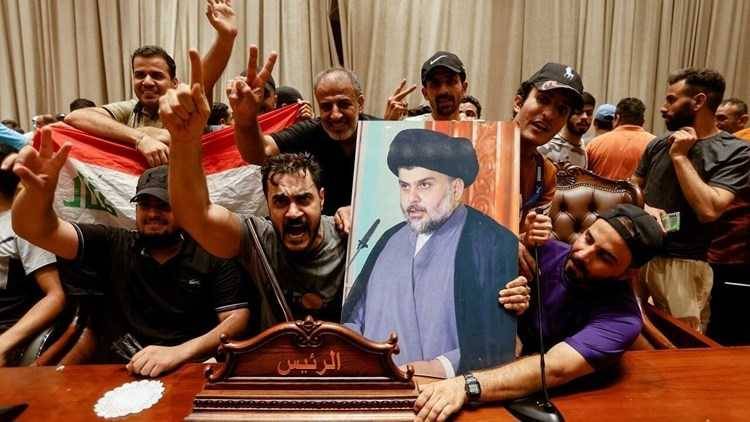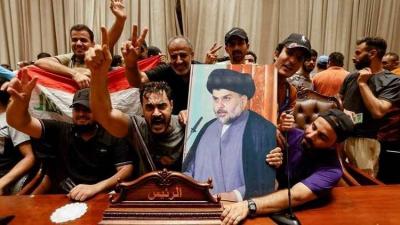Calm has returned to the Iraqi capital, Baghdad, following the withdrawal of supporters of the Sadrist movement from inside the parliament in the heavily fortified Green Zone. They stormed the parliament in protest against the nomination of Mohammed Shia' Al-Sudani by the Coordinating Framework for the position of Prime Minister. The demonstrators chanted slogans supporting Sadr and opposing the Iranian-backed "Coordinating Framework." However, they soon withdrew after the call from their leader, Muqtada Al-Sadr, about two hours after their incursion, stating, "Your message has been received... return to your homes safely." Iraq has been experiencing a political crisis for nearly nine months due to sharp disagreements over government formation between the "Coordinating Framework" and the Sadr bloc, which won first place with 73 seats out of 329 but withdrew from parliament on June 12 after being unable to form a government, which Sadr considered "a sacrifice for the homeland and the people to free them from an unknown fate." Eleven days after the withdrawal, 64 new deputies took the oath of office, most of whom were from forces close to the "Coordinating Framework," ensuring the necessary parliamentary quorum for the government formation. But what is the message behind these events?
Retired Brigadier General Nizar Abdul Qader told "Al-Markazia": "It seems, according to sources well-acquainted with geopolitical dynamics in Iraq, that Mohammed Shia' Al-Sudani will be the shadow of Nouri Al-Maliki in the government presidency. This has prompted popular forces, including supporters of Muqtada Al-Sadr, to protest in the Green Zone and enter the parliament as a movement against this appointment, as they reject returning to leadership subordinated entirely to Iran's interests in Iraq," noting that "this issue is the crux of the conflict that has persisted since the elections until today. The Sadrist movement does not want to return at all to the way things were during the era of the Islamic Dawa Party and the State of Law Coalition headed by Al-Maliki, while the Coordinating Framework, which consists of militias, means imposing Iran's will on the Iraqi people through Iranian-affiliated Popular Mobilization militias."
Abdul Qader emphasized that "Iraq's problem is largely similar to Lebanon's with Hezbollah, which seeks to impose a president and governments and political forces and legislate an electoral law to form a majority in parliament, thus controlling the executive authority, be it the President, such as the case with President Michel Aoun, and forming the government, especially if it is not complete, then with a blocking third, thereby crippling Cabinet decisions whenever they like." He pointed out that "this is what is happening in Iraq as well, where they want to revert to a government that is not Mustafa Al-Kadhimi's, who acted with complete national balance and reopened Iraq to Arab countries, especially the Gulf states. This is something that Iranian-affiliated forces do not want, which is why they brought this format; that is, the possibility of forming a government by the united Sadrist bloc with Speaker of Parliament Mohammed Al-Halbousi and other Sunni forces, along with Kurdish forces, to continue the path initiated by Al-Kadhimi with greater independence and distance from Iranian influence. This is not what the militias affiliated with Iran and the State of Law Coalition, led by Al-Maliki, want, as they are entirely under Iranian influence. This indicates that Al-Maliki is leading Iran's battle; we saw him yesterday on media outlets after the tumultuous demonstrations in the Green Zone, walking with an armed group, personally carrying a rifle."
Abdul Qader concluded: "Matters have reached a quasi-military confrontation or may escalate to a quasi-military confrontation between the two currents, the national movement and the Iranian-aligned one, and there may be fear of dire consequences in these tense atmospheres, especially since Muqtada Al-Sadr asked the masses who entered the parliament to exit the Green Zone and the parliamentary building to avoid an armed clash that could push Iraq to the brink of an actual civil war. Particularly since this time the war would generally take a Shiite-Shiite character between the nationalists among the Shiites and supporters of Iranian influence on the other side. This situation is dangerous; I believe it may be difficult to form a government headed by Mohammed Shia' Al-Sudani, and the crisis will continue, leaving the situation open to all possibilities."




